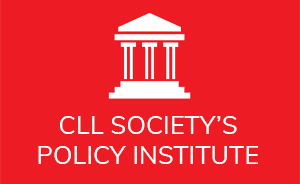Home » Innovation – CLL Society’s Policy Institute

Innovation
The Innovation pillar of CLL Society’s Policy Institute is critical, as it includes our efforts to address policies that could potentially inflate CLL / SLL drug prices and skew healthcare provider incentives.
We are particularly concerned with FDA programs and policies that potentially stifle future innovation, particularly surrounding the development of new drugs for rare diseases. CLL Society’s Policy Institute will focus our innovation efforts on policy solutions that will aim to promote and accelerate the development of new and effective therapies for CLL / SLL.
All drugs approved for CLL / SLL are essentially palliative and not curative, meaning they can only control the disease for a limited amount of time before the cancer returns, which then causes the individual to then move on to a new drug class for treatment. Since patients are thankfully living longer and longer with their disease, they may run out of options as their disease progresses over the extended length of time. We are more concerned now than ever about government policy issues that are dampening new next-generation drug development treatment options, and we will continue to advocate in this area for those living with CLL / SLL.
The following are some of the efforts that fall under the Policy Institute's ‘Innovation’ pillar:
Inflation Reduction Act (IRA) Provisions.
The Policy Institute will evaluate possible avenues of a legislative “fix” for certain provisions of the IRA that directly harm innovation. The most obvious ones include loss of the direct negotiation exemption for orphan drugs with more than one indication, since it pushes smaller rare disease conditions such as CLL / SLL to the backburner of research/innovation by penalizing future drug labeled uses.
Fifth Prescription Drug User Fee Act (PDUFA 5) Implementation.
With PDUFA 5 recently enacted, CLL Society’s Policy Institute would like to assess patient-focused provisions that could support our community and should be monitored for implementation. These provisions include rare disease advisory committee changes and the use of real-world evidence.
HEART Act Implementation.
The Helping Experts Accelerate Rare Treatments (HEART) Act was passed in the Omnibus at the year-end of 2022. It too contains numerous provisions in support of rare disease patient engagement and small population study experts. Appropriations report language called on Congress to, “Encourage the FDA to work to include no less than two expert members on each Advisory Committee when that Committee is reviewing a drug that has been designated as an Orphan Drug. The agreement directs FDA to report the percentage of recommendations made by Advisory Committees with respect to orphan drugs.”
FDA.
Accelerated drug approval pathways have been used most often in oncology and rare diseases but continue to come under fire for lack of consistency in completing confirmatory studies. Furthermore, efforts to limit access to treatments approved under this pathway are extremely concerning. These efforts include Medicaid and CHIP Payment, Access Commission (MACPAC) discussions, recommendations on imposing additional rebates for accelerated approval drugs, as well as the CMS’s recent Alzheimer’s disease national coverage decision which all but foreclosed access to a set of new treatments unless patients enroll in randomized, controlled clinical trials.
While the FDA’s Office of Oncologic Diseases (OOD) is often cited as a model for others to follow, recent frustrations have been shared across the rare disease community. We must continually seek to improve processes and patient advocacy organization engagement at the Oncology Center of Excellence, including both programs developed at FDA and in recently enacted legislation. Under the auspices of CLL Society’s Policy Institute, it will be important to evaluate and assess the FDA’s recently announced effort to ‘clean up’ confirmatory oncology trials.
Cancer Moonshot.
The Cancer Moonshot program is led by President and First Lady Biden, with a mission to accelerate the rate of progress against cancer. The stated goal of the Cancer Moonshot initiative is to cut cancer deaths by 50% over the next 25 years by accelerating scientific discovery in cancer, fostering greater collaboration, and improving the sharing of cancer data. We hope to become more involved in the Cancer Moonshot initiatives.
SUMMARY OF OUR INNOVATION-RELATED POLICY WORK
RECENT NEWS
Home » Innovation – CLL Society’s Policy Institute

Innovation
The Innovation pillar of CLL Society’s Policy Institute is critical, as it includes our efforts to address policies that could potentially inflate CLL / SLL drug prices and skew healthcare provider incentives.
We are particularly concerned with FDA programs and policies that potentially stifle future innovation, particularly surrounding the development of new drugs for rare diseases. CLL Society’s Policy Institute will focus our innovation efforts on policy solutions that will aim to promote and accelerate the development of new and effective therapies for CLL / SLL.
All drugs approved for CLL / SLL are essentially palliative and not curative, meaning they can only control the disease for a limited amount of time before the cancer returns, which then causes the individual to then move on to a new drug class for treatment. Since patients are thankfully living longer and longer with their disease, they may run out of options as their disease progresses over the extended length of time. We are more concerned now than ever about government policy issues that are dampening new next-generation drug development treatment options, and we will continue to advocate in this area for those living with CLL / SLL.
The following are some of the efforts that fall under the Policy Institute's ‘Innovation’ pillar:
Inflation Reduction Act (IRA) Provisions.
The Policy Institute will evaluate possible avenues of a legislative “fix” for certain provisions of the IRA that directly harm innovation. The most obvious ones include loss of the direct negotiation exemption for orphan drugs with more than one indication, since it pushes smaller rare disease conditions such as CLL / SLL to the backburner of research/innovation by penalizing future drug labeled uses.
Fifth Prescription Drug User Fee Act (PDUFA 5) Implementation.
With PDUFA 5 recently enacted, CLL Society’s Policy Institute would like to assess patient-focused provisions that could support our community and should be monitored for implementation. These provisions include rare disease advisory committee changes and the use of real-world evidence.
HEART Act Implementation.
The Helping Experts Accelerate Rare Treatments (HEART) Act was passed in the Omnibus at the year-end of 2022. It too contains numerous provisions in support of rare disease patient engagement and small population study experts. Appropriations report language called on Congress to, “Encourage the FDA to work to include no less than two expert members on each Advisory Committee when that Committee is reviewing a drug that has been designated as an Orphan Drug. The agreement directs FDA to report the percentage of recommendations made by Advisory Committees with respect to orphan drugs.”
FDA.
Accelerated drug approval pathways have been used most often in oncology and rare diseases but continue to come under fire for lack of consistency in completing confirmatory studies. Furthermore, efforts to limit access to treatments approved under this pathway are extremely concerning. These efforts include Medicaid and CHIP Payment, Access Commission (MACPAC) discussions, recommendations on imposing additional rebates for accelerated approval drugs, as well as the CMS’s recent Alzheimer’s disease national coverage decision which all but foreclosed access to a set of new treatments unless patients enroll in randomized, controlled clinical trials.
While the FDA’s Office of Oncologic Diseases (OOD) is often cited as a model for others to follow, recent frustrations have been shared across the rare disease community. We must continually seek to improve processes and patient advocacy organization engagement at the Oncology Center of Excellence, including both programs developed at FDA and in recently enacted legislation. Under the auspices of CLL Society’s Policy Institute, it will be important to evaluate and assess the FDA’s recently announced effort to ‘clean up’ confirmatory oncology trials.
Cancer Moonshot.
The Cancer Moonshot program is led by President and First Lady Biden, with a mission to accelerate the rate of progress against cancer. The stated goal of the Cancer Moonshot initiative is to cut cancer deaths by 50% over the next 25 years by accelerating scientific discovery in cancer, fostering greater collaboration, and improving the sharing of cancer data. We hope to become more involved in the Cancer Moonshot initiatives.



